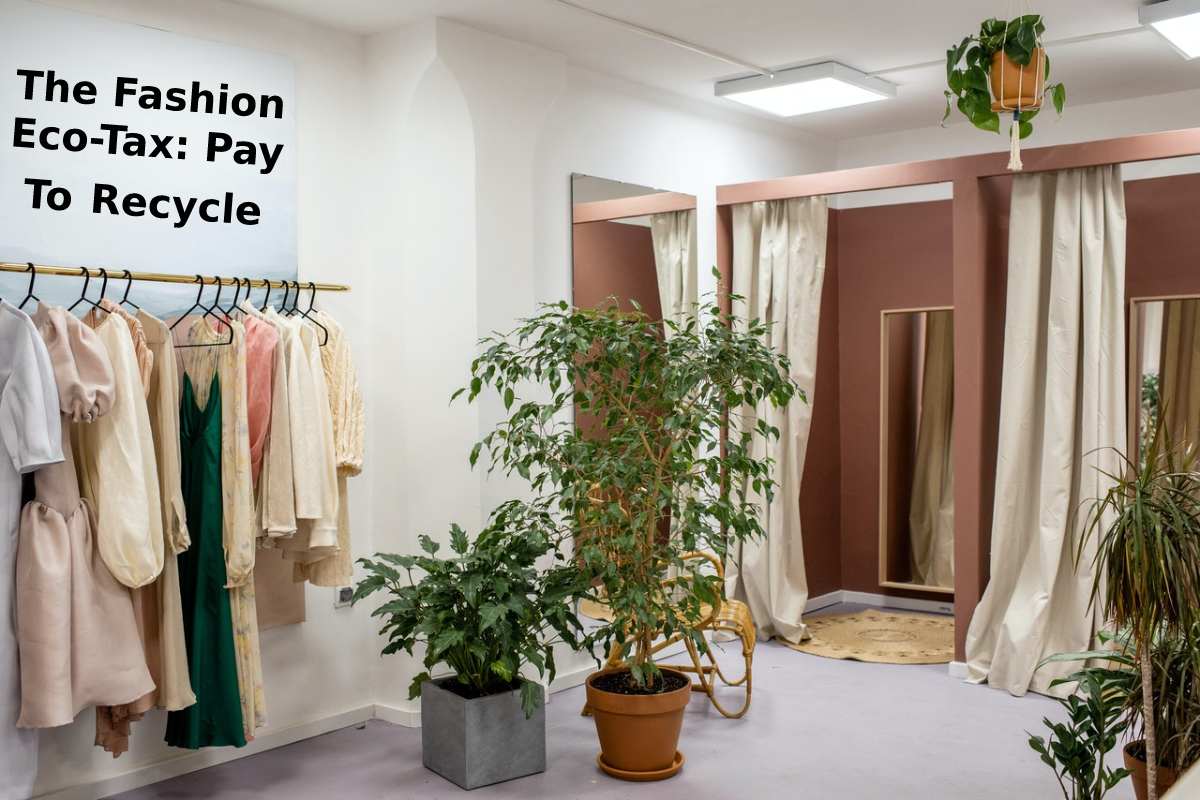The Fashion Eco-Tax: Pay To Recycle – There is additional and more talk about the need to recycle clothes and in recent days, much more. The issue is shaking the textile industry, and there is a reason. In 2022, this sector will have to contribute to preserving the environment through the fashion eco-tax.
Companies dedicated to manufacturing clothing will have to pay a tax if they do not give a second life to the waste resulting from the manufacture of fabrics. It means that, most likely, many of the clothes that we will see in stores will come from leftover materials and threads from factories.
According to the United Nations Organization, the fashion industry is the second most polluting globally, and we are all contributing to it in some way. We were surprised Keep reading because I explain all the details you need to know about the eco-tax on fashion.
Table of Contents
Consumers + Pollution = Fashion Ecotax
Ten years ago, few people cared about repeating clothing. But today we want to be more fashionable, and we buy 60% more clothes. Furthermore, many consumers wear each outfit an average of ten times and then throw it away. Except for our favorite jeans!
The figures support this reality. About 30 kilos of textile waste per person arrive at landfills every year. In other words, more than 900,000 tons of this type of rubbish are generated annually in Spain. Did you have any idea about this?
Fashion Eco To Recycle
Fashion Eco To Recycle – The situation has caused waste from the textile industry to affect the planet as much as fossil fuels. Furthermore, less than 1% of fashion companies recycle. With this in mind, the Spanish authorities intend to stop the climate crisis caused by clothing.
It is Law Waste Contaminated Soils born. Fashion eco-tax has a particular point that draws people’s attention in one way related to fashion.
What Will Companies Do Now?
The new Spanish Waste Law will oblige the industry not to destroy fabrics and recycle all garments.
I don’t know if it causes the same curiosity to you as I do, but it is intriguing to see how the essential brands turn what we throw away into a trend. I am very sure that they will surprise us!
What is known so far about the fashion eco-tax that the brands have to create what they call Extended Producer Responsibility (RAP), in which they will devise a system for deposits, refunds, and returns. It is the same format that with cardboard, plastic, and glass.
The Future Of Fashion: More Austerity?
If you are one of those who like shine, metallic colors, buttons, zippers, and everything that attracts attention in a garment, I have news for you: austerity is emerging as the new trend.
The law is also very explicit when it says that the design of the clothes has to be simple to facilitate their reuse, so the mixture of many materials and decorations could break the law. But beyond that, we may now have to pay more for clothes.
One of the alternatives that the industry is studying to cover recycling costs or pay the fashion eco-tax is to raise the prices of clothing slightly. So at the end of the period, we better think twice before throwing away the clothes.
It could also happen that brands start to reduce their production. It also not ruled out that they do both, that is, less clothing and higher prices at the same time.
What Happens To Persons Who Do Not Comply?
The fashion eco-tax comes in because all the brands that do not adapt to these changes will have to pay a tax. The industry will not be able to throw anything away; everything needs to have a new life and to ensure that it, the State will hit where it hurts the most: profits.
In addition to all this, they will not destroy the surpluses that were. Fashion in Spain has not involved in the ecological issue, but it is expected that the regulations will approved in February 2022. From that moment, the great turnaround should take place.
Something Had To Done
Many experts point out that the pollution that the fashion industry causes to the planet is getting out of hand. So it was necessary to lay the first stone to build a new way of contributing to the environment.
You will interested to know that the Spanish only recycle 12.16% of the clothes. The rest goes in the trash. So before discarding shirts, pants, or dresses, or when choosing the best outfit for the parties, consider if you contribute or help preserve the environment with this.
So you have an idea:
- One kilogram of polyester fiber consumes 108 kW of energy per hour and about 3 kilograms of carbon dioxide.
- The production of cotton, which one of the most used fibers globally, estimated at 27 million tons each year. Each kilo of this material implies consumption of 1,500 liters of water.
As you can see, we are at the gates of a profound change. The implementation of the fashion eco-tax will impact an industry that, during the 21st century. Has invoiced more than 2.5 billion dollars and employs more than 75 million people around the world.
So it was to expected that it caused a big Wow! while we get to the idea and become aware of it.

